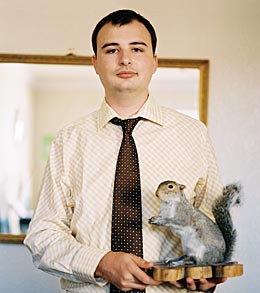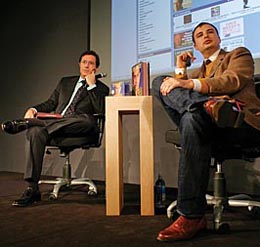Four months ago, Apple Computer flew UCSC alumnus Jesse Thorn back east to interview Comedy Central's Stephen Colbert in front of a live audience at its flagship store in New York City. Not a bad gig for a 26-year old who was thrilled to get his first show on college radio in 1999.
But Thorn has come a long way in a short time. The Sound of Young America, the irreverent arts and comedy interview show he created while a student at UCSC, was picked up in June for distribution by Public Radio International (PRI)--the same people who bring Ira Glass's award-winning This American Life and the BBC News to audiences each week across the country. So when the folks at Apple needed someone to host Colbert for a live podcast that would be posted as a free download on i-Tunes, Thorn got the call.
"Stephen Colbert is exactly the guy you hoped he would be," Thorn says by phone from his L.A. apartment, where he produces The Sound of Young America once a week. "He's astonishingly funny, and really thoughtful."
Those same words could be used to describe Thorn himself, whose persona lies somewhere between NBC's Conan O'Brien and NPR's Terry Gross. A tour-de-force of casually funny, yet in-depth "behind-the-scenes" interviews, Thorn's show features cutting-edge comics, writers, artists, and musicians. His guests range from top comedians such as Patton Oswalt, Sarah Silverman, and Paula Poundstone; to original Saturday Night Live writer and television producer Anne Beatts; Pulitzer Prize-winning cartoonist Art Spiegelman and former New Yorker staff writer Lawrence Wechsler; to rapper Chuck D, author Nick Hornby, and punk rocker turned TV talk-show host Henry Rollins.
"My goal is to have the intelligence of public radio without being self-consciously dull," says Thorn, taking a youthful jab at NPR. "I'm not personally interested in celebrity, but I'm very interested in people who make things," he adds. "In TV for example, the writer is the one whose voice is expressed. That's why I rarely book actors. Why would I talk to the actors when I could talk to the guy who thought of the idea?"
The Sound of Young America was originally broadcast on the campus station KZSC while Thorn was a student at UCSC. He majored in American Studies--with a focus on expressive cultures. After graduating in 2003, Thorn applied for jobs in both public and commercial radio around the country, including NPR stations in Washington, D.C., but he couldn't catch a break. "I didn't even get interviews," he recalls. So Thorn worked at various low-level jobs for nonprofits and went through periods of unemployment, all the while continuing to produce the weekly program.
Near the end of 2004, The Sound of Young America became the first public radio show on the West Coast to begin podcasting and was spotlighted in the Wall Street Journal, Time Magazine and Salon.com. A few months later, Thorn received a call from the director of programming at PRI, who had heard one of the podcasts and expressed interest in distributing the show. Thorn heard nothing again for nearly a year.
But in spring of 2006, WNYC--one of the five largest public radio stations in the country--decided to air his program. It had been recommended to the station by comedian John Hodgman (now of Jon Stewart's The Daily Show), who had been a guest on The Sound of Young America. PRI was soon on board.
Thorn now works 50 or 60 hours a week to produce the show. He also creates a separate weekly podcast of comedy shows, reflecting his longtime love of comedy and his own participation in various improv groups over the years. Recently, he even filmed a show for a television pilot at the invitation of a cable network. "They told me 'we're looking for a Charlie Rose for younger demographics,'" says Thorn. "So the format of the pilot is a cross between Charlie Rose and the Howard Stern TV show."
Despite coming of age in a rapidly changing media climate, Thorn is confident there's a place for him in the broadcasting world of the future--whatever form it takes.
"Who knows what medium will be popular in 10 years," says Thorn. "What I do know is that in a world with lots of choices, I have to do something that people will care about. So I have to care. I have values that are reflected in my show--intelligence and fun--and that's what people like about it. In new media, it's important to mean something."
"The people I have on my show enjoy talking with someone who is really interested in their work," he adds. "Unfortunately, authors are used to being interviewed by people who didn't actually read the book. Comedians are used to doing interviews with idiots. And musicians are used to talking to people who were assigned to cover them, or by overly intense fans.
"From the beginning, just the fact that we actually cared about our subject matter put us head and shoulders above most other people in radio doing interviews."
Check out Jesse Thorn's The Sound of Young America at www.maximumfun.org
Contact the author at srapp@ucsc.edu.




